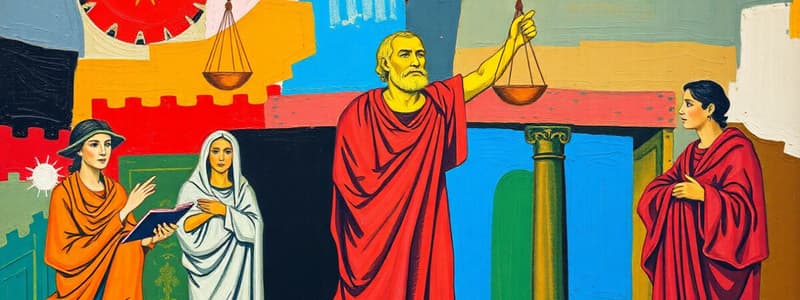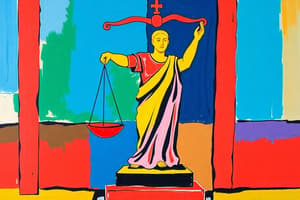Podcast
Questions and Answers
What does Socrates claim about justice in relation to happiness?
What does Socrates claim about justice in relation to happiness?
- Injustice is more favorable than justice.
- Justice is merely a societal construct.
- The just person is happy and blessed. (correct)
- Justice leads to conflict with others.
Which of the following best describes Plato's view on the philosopher-king?
Which of the following best describes Plato's view on the philosopher-king?
- Political power should solely belong to the wealthy.
- The philosopher-king should prioritize personal gain over common good.
- Philosophers should only study philosophical texts.
- Political power should be held by philosophers who understand justice. (correct)
How does Plato differentiate between lovers of the senses and lovers of knowledge?
How does Plato differentiate between lovers of the senses and lovers of knowledge?
- Lovers of knowledge appreciate tangible experiences.
- Lovers of senses enjoy physical and sensory experiences. (correct)
- Lovers of knowledge are indifferent to beauty.
- Lovers of senses focus on abstract concepts.
What does Plato consider to be true reality?
What does Plato consider to be true reality?
According to Socrates, what should a just ruler prioritize?
According to Socrates, what should a just ruler prioritize?
What are Platonic Forms, according to Plato's theory?
What are Platonic Forms, according to Plato's theory?
What does Socrates' definition of justice include?
What does Socrates' definition of justice include?
What does philosophy encompass according to Plato?
What does philosophy encompass according to Plato?
Which of the following statements best describes Plato's view on scientific claims?
Which of the following statements best describes Plato's view on scientific claims?
What is one of the main criticisms of relativism presented in the content?
What is one of the main criticisms of relativism presented in the content?
What danger does Plato associate with the concept of a 'false' philosopher-king?
What danger does Plato associate with the concept of a 'false' philosopher-king?
What does absolutism argue about standards for justice and beauty?
What does absolutism argue about standards for justice and beauty?
According to the content, what is one potential benefit of relativism?
According to the content, what is one potential benefit of relativism?
What does knowing the Form or Definition entail?
What does knowing the Form or Definition entail?
What aspect of the philosopher-king does Plato emphasize as important?
What aspect of the philosopher-king does Plato emphasize as important?
What is implied about education in the context provided?
What is implied about education in the context provided?
How does the allegory of the cave describe the prisoner's ascent?
How does the allegory of the cave describe the prisoner's ascent?
What is a significant challenge of absolutism mentioned in the content?
What is a significant challenge of absolutism mentioned in the content?
What distinguishes true philosophers from others according to the content?
What distinguishes true philosophers from others according to the content?
What is the philosopher's perspective according to the content?
What is the philosopher's perspective according to the content?
What happens to the prisoner upon descending back into the cave?
What happens to the prisoner upon descending back into the cave?
According to Socrates in the discussion, what would the philosopher prefer over worldly honors?
According to Socrates in the discussion, what would the philosopher prefer over worldly honors?
What do shadows in the allegory represent?
What do shadows in the allegory represent?
What does Plato's view suggest about the relationship between knowledge and reality?
What does Plato's view suggest about the relationship between knowledge and reality?
What distinguishes Forms from Particulars?
What distinguishes Forms from Particulars?
What term describes the difference between belief and knowledge?
What term describes the difference between belief and knowledge?
In the context of the philosopher's ideas, which of the following statements is true?
In the context of the philosopher's ideas, which of the following statements is true?
Which of the following best describes how we perceive Particulars?
Which of the following best describes how we perceive Particulars?
What concept is represented by 'triangularity' in the philosopher's discussion?
What concept is represented by 'triangularity' in the philosopher's discussion?
How does knowledge relate to the concept of Forms according to the philosopher?
How does knowledge relate to the concept of Forms according to the philosopher?
Why is knowledge considered superior to opinion?
Why is knowledge considered superior to opinion?
Which statement best captures the relationship between ignorance, opinion, and knowledge?
Which statement best captures the relationship between ignorance, opinion, and knowledge?
Flashcards
Knowledge Infallibility
Knowledge Infallibility
Knowledge cannot be proven false.
Knowing a Form or Definition
Knowing a Form or Definition
Understanding why a thing is classified as it is and not something else, going beyond just identifying examples.
The Cave's Shadows
The Cave's Shadows
The prisoners in Plato's allegory initially perceive shadows as reality.
Painful Ascent
Painful Ascent
Signup and view all the flashcards
Blinded by Reality
Blinded by Reality
Signup and view all the flashcards
Education's Purpose
Education's Purpose
Signup and view all the flashcards
Prisoners of Opinions
Prisoners of Opinions
Signup and view all the flashcards
Philosopher's Journey
Philosopher's Journey
Signup and view all the flashcards
What is Justice? (Socrates' Questions)
What is Justice? (Socrates' Questions)
Signup and view all the flashcards
Justice is Virtue
Justice is Virtue
Signup and view all the flashcards
Justice in a City
Justice in a City
Signup and view all the flashcards
Philosopher-King
Philosopher-King
Signup and view all the flashcards
Two Kinds of Lovers of 'Learning'
Two Kinds of Lovers of 'Learning'
Signup and view all the flashcards
Philodoxers
Philodoxers
Signup and view all the flashcards
True Reality Beyond the Senses
True Reality Beyond the Senses
Signup and view all the flashcards
The Platonic Forms
The Platonic Forms
Signup and view all the flashcards
Forms
Forms
Signup and view all the flashcards
Particulars
Particulars
Signup and view all the flashcards
What does 'instantiate' mean?
What does 'instantiate' mean?
Signup and view all the flashcards
What is the relationship between Forms and particulars?
What is the relationship between Forms and particulars?
Signup and view all the flashcards
Opinion vs. Knowledge
Opinion vs. Knowledge
Signup and view all the flashcards
The Cave Analogy
The Cave Analogy
Signup and view all the flashcards
Why is knowledge better than opinion?
Why is knowledge better than opinion?
Signup and view all the flashcards
What is the philosopher's journey?
What is the philosopher's journey?
Signup and view all the flashcards
Scientific Claims and Truth
Scientific Claims and Truth
Signup and view all the flashcards
Plato's Ideal of Truth
Plato's Ideal of Truth
Signup and view all the flashcards
What is a Philosopher-King?
What is a Philosopher-King?
Signup and view all the flashcards
Why Are Philosophers Fit to Rule?
Why Are Philosophers Fit to Rule?
Signup and view all the flashcards
The Problem of 'False' Philosopher-Kings
The Problem of 'False' Philosopher-Kings
Signup and view all the flashcards
Relativism vs. Absolutism
Relativism vs. Absolutism
Signup and view all the flashcards
The Problem with Relativism
The Problem with Relativism
Signup and view all the flashcards
The Problem with Absolutism
The Problem with Absolutism
Signup and view all the flashcards
Study Notes
Plato's Republic
- Plato's Republic is a philosophical dialogue
- Original name: Politeia, relating to the polis.
- Today, the Latin name, res publica, is used.
What is Justice? (Book I)
- Many definitions of justice exist, including:
- Speaking the truth and paying one's debts
- Giving to each what is due
- The interests of the strongest
- Socrates argues that:
- Justice is virtue
- Justice is stronger than injustice
- The just person is happy and blessed
- A just ruler considers the good of the ruled, not their own well-being.
- A just ruler rules unwillingly.
The Philosopher-King
- Socrates argues:
- A perfect society needs philosophers to hold political power.
- Key questions:
- Who are the true philosophers?
- How can philosophers be differentiated from others?
- Why are philosophers better suited to rule a city?
Two Kinds of Lovers of Learning
- Lovers of the senses:
- Find beauty in things like paintings, shapes, melodies, and exotic foods.
- Driven by a desire or love for learning.
- Driven by the physical world.
- Lovers of knowledge:
- Appreciate essences, definitions, or Forms.
- Find beauty in things like abstract concepts of beauty, justice, and harmony.
- Seek wisdom.
True Reality Beyond the Senses
- Philosophy reveals a realm beyond everyday common sense, containing comprehensive and unitary hidden truths.
- These truths can revolutionize lives and improve societies.
- The Platonic Forms are concepts or ideas existing beyond the physical world.
- Forms are eternal and unchanging.
- They are known through thought, not sensation (e.g., Equality, Sameness, Number, Motion, Beauty, Justice, Piety and Goodness).
Plato's Theory of Forms/Ideas
- Examining particular examples reveals essence.
- A definition captures the essence of a concept or category.
- Essences reveal things as "one in the many"
- Forms are what people think when they perceive the physical world
- Particulars are the things we experience in day-to-day life.
- Forms cause instantiation.
Questions about Forms
- Which side, Forms or particulars, is primary?
- How do we know things are triangles?
- What is the true nature of reality?
- Can Forms be destroyed?
Opinion versus Knowledge
- Particulars are perceived through the senses.
- Particulars are imperfect, changeable, and mortal.
- Knowledge of Forms is absolute and unchanging.
- Knowledge of Forms is achieved through the mind.
The Allegory of the Cave
- Prisoners in a cave only see shadows and assume these are reality.
- Escape and ascent—a painful process to enlightenment.
- Understanding of the true nature of reality from the Forms.
- Enlightenment may mean isolation from those still in the cave.
Why is Knowledge Better Than Opinion?
- Knowledge is infallible (it cannot turn out to be false).
- Understanding the forms allows us to determine the essence of something.
- Knowledge reveals why something is what it is.
The Philosopher-King (continued)
- Key questions regarding ideal leadership
- The importance of having the right kind of ruler.
Absolutism vs. Relativism
- Absolutism: There are unchanging standards for justice, beauty, and truth.
- Relativism: There are no universally accepted standards; everything is relative to individual opinion.
- Strengths and weaknesses of both positions.
Discussion
- Arguments for and against the existence of absolute standards or true realities.
- The value of true principles.
- Difficulty in accepting truths about justice and other concepts, if they cannot be seen or experienced directly.
Studying That Suits You
Use AI to generate personalized quizzes and flashcards to suit your learning preferences.




